Ever feel like your brain's in a fog? You’re not alone! Brain fog often tags along with anxiety, turning your thoughts into a muddle. When stress hits, it can cloud your focus and zap your memory, leaving you frustrated and mentally drained. You might forget things easily or struggle to concentrate, wondering why it feels so hard to think straight. Want to break free from this cycle and regain clarity? There's more to explore on how to tackle this pesky issue!
Key Takeaways
- Brain fog often occurs alongside anxiety, as both conditions share symptoms like difficulty concentrating and forgetfulness.
- Anxiety increases stress hormones, which can impair cognitive function and memory retention, worsening brain fog.
- Persistent worry from anxiety leads to mental clutter, making it harder to process and absorb new information.
- Lifestyle changes such as mindfulness, exercise, and balanced nutrition can help alleviate both brain fog and anxiety symptoms.
- Recognizing the link between anxiety and brain fog empowers individuals to seek effective strategies for mental clarity and well-being.
Understanding Brain Fog: What It Is and How It Feels

Have you ever found yourself staring blankly at a page, struggling to remember what you just read, or feeling as if you’re wading through molasses in your own mind? That’s brain fog for you—an all-too-common experience that can leave you feeling mentally sluggish and frustrated.
It’s that hazy cloud that creeps in when you’re juggling a million thoughts at once, often resulting from cognitive overload. You might feel like you’re losing your sharpness, as if your brain’s running on low battery. Ideas can slip away, and simple tasks start to feel Herculean.
This fog isn’t just annoying; it can steal your freedom to think clearly and act effectively. Imagine steering through life with clarity instead, free from that mental haze.
Understanding brain fog is the first step in reclaiming your mental space, so don’t ignore those fuzzy feelings—acknowledge them and seek the clarity you deserve.
The Science Behind Anxiety and Cognitive Function
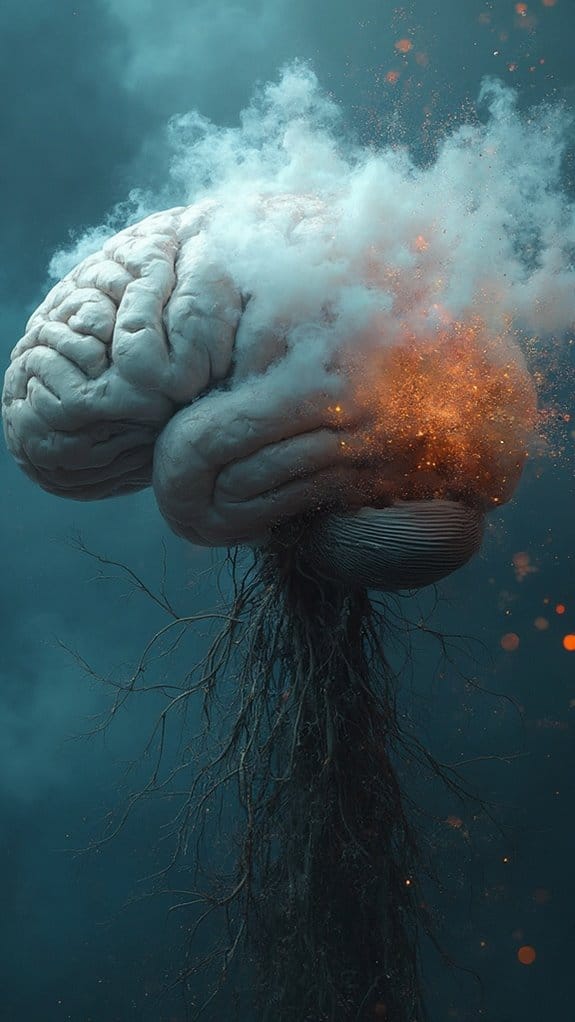
Anxiety's impact on your brain can be as perplexing as maneuvering through a thick fog. It can cloud your thoughts and hinder your cognitive function, leaving you feeling scattered. But understanding this connection is empowering! By grasping how anxiety affects your brain, you can take steps for effective anxiety management and boost your cognitive resilience.
Here’s a quick overview of how anxiety and cognitive function interact:
| Effect of Anxiety | Cognitive Impact | Management Strategies |
|---|---|---|
| Increased stress | Impaired memory | Mindfulness practices |
| Heightened arousal | Reduced focus | Physical exercise |
| Persistent worry | Slowed processing | Deep breathing |
| Sleep disruption | Decision fatigue | Healthy sleep habits |
Recognizing these effects allows you to reclaim your mental clarity. So, what steps will you take today to enhance your cognitive resilience?
Common Symptoms of Brain Fog
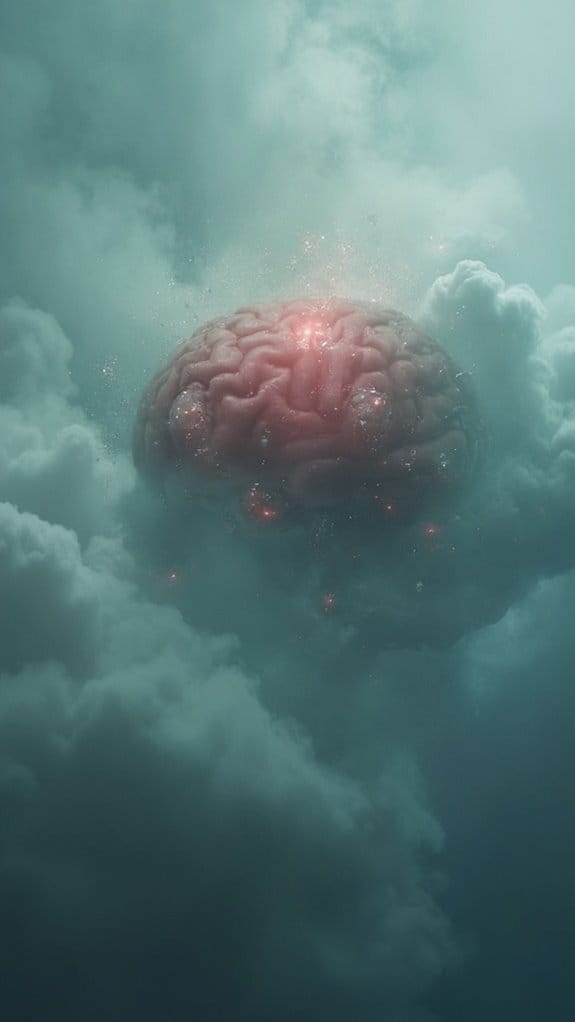
Sometimes, you might find yourself struggling to concentrate or feeling like you're in a haze, and that's what many refer to as brain fog. This state can be frustrating, especially when you have things to do.
You might notice a few common symptoms creeping in, often linked to cognitive overload or common triggers like stress. Here’s what to look out for:
- Difficulty focusing on tasks
- Forgetting simple things, like where you put your keys
- Feeling mentally exhausted after minimal effort
- Trouble finding the right words during conversations
- A general sense of confusion or disorganization
If you can relate to these symptoms, you're not alone. It’s essential to recognize these signs, as they can impact your daily life and well-being.
How Anxiety Triggers Brain Fog
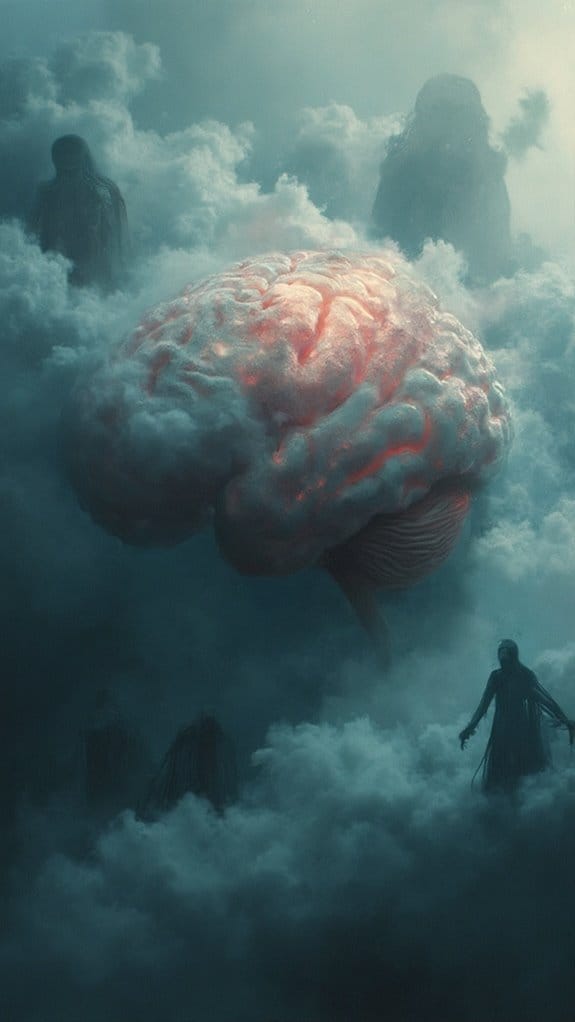
Feeling like your brain is wrapped in cotton can be even more frustrating when anxiety is lurking in the background. Have you noticed how anxiety triggers that foggy feeling? It’s like your mind's a cluttered attic, filled with worries and fears that create cognitive overload.
When you’re anxious, your brain is bombarded with racing thoughts, making it tough to focus on anything meaningful. You might find yourself forgetting simple things or struggling to follow conversations.
This overload can drain your mental energy, leaving you feeling exhausted and stuck. What if you could break free from this cycle? Recognizing that anxiety triggers brain fog is the first step.
The Role of Stress Hormones in Mental Clarity
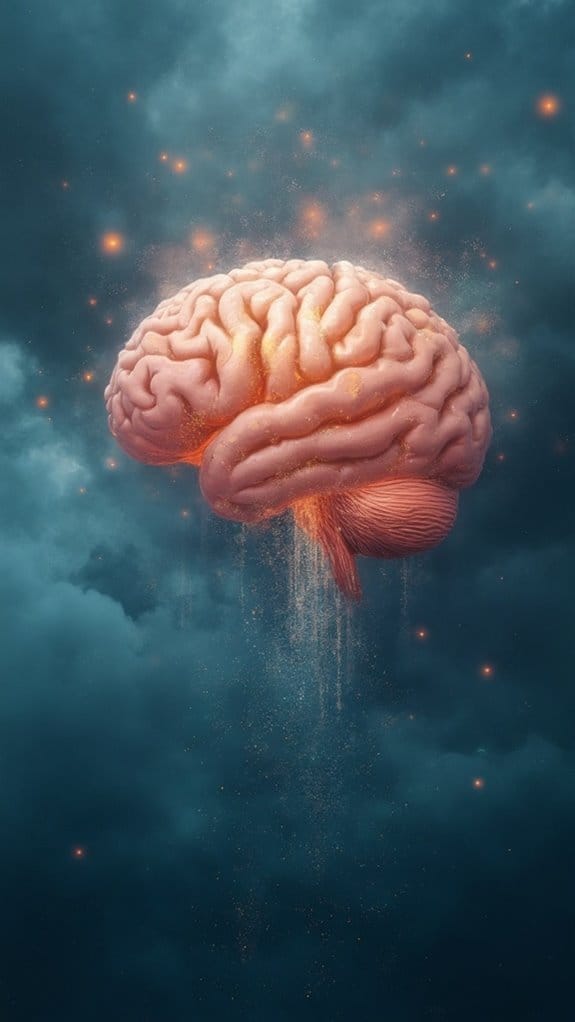
When stress kicks in, your body releases hormones like cortisol and adrenaline, and these little guys can really mess with your mental clarity. You might find it hard to focus, remember things, or think straight.
This stress response can wreak havoc on your daily life, but understanding hormone regulation can help you regain control.
Here’s how stress hormones impact your brain:
- Cortisol spikes can cloud your thoughts.
- Adrenaline rushes may lead to racing thoughts.
- Prolonged stress can impair memory.
- Mood swings can make concentration tough.
- Sleep disturbances can further fog your mind.
Ever feel like you’re in a mental haze? It’s no wonder!
Mindfulness and Its Impact on Anxiety and Brain Fog

Mindfulness isn’t just a buzzword; it’s a powerful tool that can help you tackle anxiety and brain fog head-on. You might be wondering how this works. Well, mindfulness techniques, like deep breathing and focused meditation practices, allow you to center your thoughts and regain mental clarity.
When you practice being present, you create space for positive thoughts to emerge, pushing aside the anxiety that clouds your mind.
Imagine starting your day with just five minutes of meditation. You’d be amazed at how this simple act can pave the way for a clearer, more focused day.
By incorporating mindfulness into your routine, you’re not just alleviating anxiety; you’re also combating that pesky brain fog. It’s about reclaiming your mental freedom, one conscious breath at a time.
Nutritional Deficiencies That Can Worsen Brain Fog

Brain fog can sometimes feel like trying to wade through a thick fog on a chilly morning, leaving you disoriented and frustrated.
One factor you mightn't consider is nutritional deficiencies that can hinder your brain's performance. If you're not absorbing the right nutrients, it could contribute to that cloudy feeling.
Here are some common deficiencies to watch out for:
- Vitamin B12: Essential for brain health and energy.
- Vitamin D: Linked to mood regulation and cognitive function.
- Omega-3 fatty acids: Important for brain structure and function.
- Iron: Crucial for oxygen transport in the blood, impacting energy levels.
- Magnesium: Supports nerve function and may help reduce anxiety.
The Importance of Sleep for Mental Clarity

We often overlook how essential sleep is for keeping our minds sharp and focused. Think about it: when you skimp on sleep, how often do you find yourself struggling to concentrate? That’s because a lack of quality sleep can lead to brain fog and anxiety, making it tough to think clearly.
Practicing good sleep hygiene—like sticking to a sleep schedule and creating a calming bedtime routine—can work wonders for your mental clarity.
On the flip side, sleep disorders can wreak havoc on your cognitive function. Imagine tossing and turning all night, only to wake up feeling groggy and irritable. It’s no surprise that your mind feels foggy!
Exercise: A Natural Remedy for Anxiety and Brain Fog

When you feel that fog creeping in, have you ever thought about hitting the gym instead of reaching for another cup of coffee?
Exercise is a fantastic natural remedy for anxiety and brain fog, and it comes with a slew of exercise benefits that can lift your spirits and clear your mind.
Consider these perks:
- Boosts serotonin levels, enhancing your mood
- Increases blood flow, improving brain function
- Reduces stress hormones, helping you feel calmer
- Promotes better sleep, which is essential for mental clarity
- Fosters a sense of accomplishment, empowering you
Strategies to Manage Anxiety and Improve Focus

Feeling overwhelmed by anxiety and struggling to concentrate can be frustrating. But don’t worry; there are strategies to help you regain your focus and feel more in control.
One effective approach is to incorporate mindfulness techniques into your daily routine. Have you tried focusing on your breath for just a few minutes? It can work wonders in calming your mind and sharpening your attention.
Cognitive exercises are another great tool. Simple puzzles or memory games can stimulate your brain while also reducing anxiety.
Why not challenge yourself with a quick Sudoku or a crossword?
The Link Between Anxiety and Memory Issues
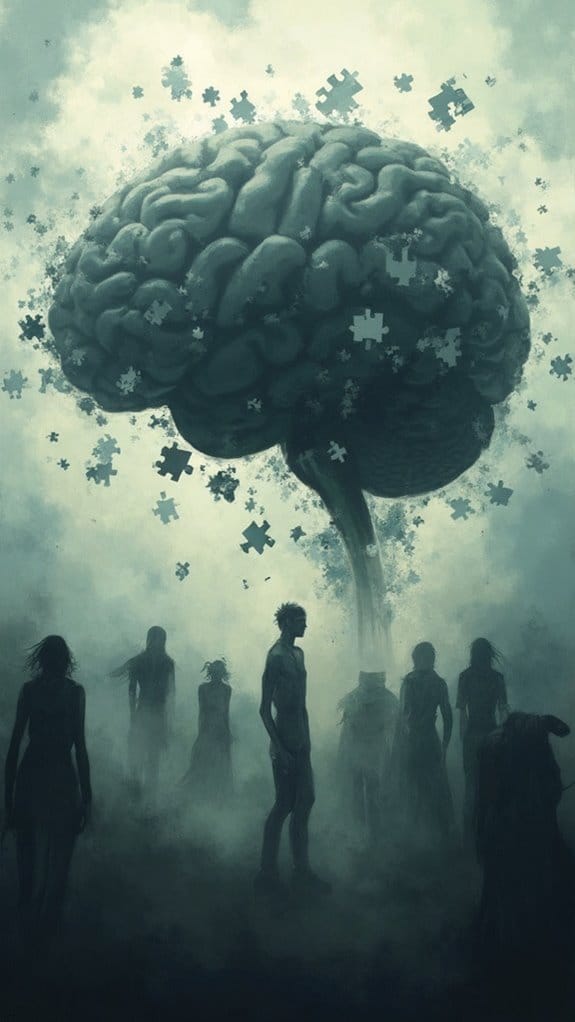
Anxiety can sneak in and mess with your memory, often leaving you feeling like you’re walking through a fog. You might find it hard to recall names, dates, or even where you left your keys. This memory impairment can be frustrating, especially when anxiety triggers seem to pop up everywhere.
Here are a few ways anxiety affects your memory:
- It disrupts focus, making it tough to absorb new information.
- Stress hormones can interfere with memory consolidation.
- Overthinking leads to mental clutter, blocking clear thoughts.
- Sleep disturbances from anxiety can hinder memory retention.
- Emotional distress can cloud your ability to recall details.
Feeling like your brain's in a haze? You're not alone. Understanding this link between anxiety and memory issues can empower you to seek solutions, giving you the freedom to regain your clarity and confidence.
When to Seek Professional Help for Anxiety

Sometimes, the fog of anxiety can get so thick that it’s hard to see a way out. You might wonder, "When should I seek professional help?" Recognizing the signs is essential for your freedom from this mental haze. Here’s a simple guide:
| Signs to Reflect On | Feeling | Next Steps |
|---|---|---|
| Persistent worry | Overwhelmed | Talk to someone you trust |
| Panic attacks | Scared | Consult a therapist |
| Difficulty functioning | Frustrated | Schedule a doctor’s visit |
| Avoidance of activities | Isolated | Reach out for support |
If anxiety disrupts your daily life, it’s time to seek professional help. Remember, asking for assistance isn’t a sign of weakness; it’s a step toward clarity and reclaiming your life. You deserve to feel free and focused!
Lifestyle Changes for Better Mental Clarity

While life can sometimes feel like a whirlwind, making small lifestyle changes can considerably boost your mental clarity. You might be surprised at how simple adjustments can clear the fog. Here are a few ideas to get you started:
- Mindful journaling: Spend a few minutes each day reflecting on your thoughts. It’s amazing what clarity can come from putting pen to paper!
- Digital detoxing: Unplug for a bit. Limiting screen time can help reduce mental clutter and anxiety.
- Regular exercise: Get moving! Physical activity releases endorphins, which can enhance your mood and focus.
- Adequate sleep: Prioritize rest. A well-rested mind is far more effective at tackling daily challenges.
- Balanced nutrition: Fuel your body with healthy foods. What you eat directly impacts your brain function!
Personal Stories: Overcoming Brain Fog Linked to Anxiety

You might think you're alone in the struggle against brain fog linked to anxiety, but countless people have faced the same battle and emerged victorious.
Take Sarah, for example. She found herself lost in a fog, unable to focus on work or enjoy life. After sharing her personal experiences with a support group, she discovered strategies that changed everything. Simple practices like journaling her thoughts and setting daily intentions helped her regain clarity.
Maybe you can relate to what she went through. Have you tried meditation or even a brisk walk? These strategies shared by others can be life-changing.
Frequently Asked Questions
Can Brain Fog Be a Symptom of Other Mental Health Conditions?
Absolutely, brain fog can signal other mental health issues.
For instance, if you’re feeling down, there’s often a depression connection that clouds your thinking. Similarly, PTSD symptoms can leave you feeling mentally drained, making it tough to focus.
You might wonder, "Why can’t I think straight?" It’s essential to recognize these signs and seek support.
After all, understanding your mind's signals can lead to greater freedom and improved mental clarity.
How Long Can Brain Fog Last Due to Anxiety?
Imagine driving through a foggy morning—visibility’s low, and you can’t see the road ahead. That’s a bit like brain fog.
When anxiety triggers kick in, brain fog can last anywhere from a few hours to several days, depending on various duration factors like stress levels and coping strategies.
Have you ever noticed how some days feel clearer than others? Finding ways to manage anxiety can help clear that mental haze.
Is Brain Fog More Common in Specific Age Groups?
You might be wondering if brain fog hits certain age groups more than others.
Well, age-related factors definitely play a role. Younger people can experience brain fog from stress or lack of sleep, while older adults may face cognitive decline, making those foggy moments more frequent.
Isn’t it interesting how our age shapes our mental clarity?
Can Medications for Anxiety Worsen Brain Fog Symptoms?
Sometimes, you can’t see the forest for the trees. When it comes to anxiety medications, it’s important to take into account their side effects.
While they can help calm your mind, they might also lead to cognitive impairment, making brain fog worse.
Have you ever wondered if the very thing that’s supposed to help is holding you back?
It’s vital to talk to your doctor about any concerns and explore alternatives that might suit you better.
Are There Specific Exercises That Help Reduce Brain Fog?
Are you feeling lost in a fog? Specific exercises can really help clear your mind.
Mindfulness meditation's a great start; it trains your brain to focus and reduces stress.
Have you tried cognitive exercises, like puzzles or memory games? They’re not just fun—they can sharpen your mental clarity.
By mixing these activities into your routine, you might just find that fog lifting.
Conclusion
So, if you’re feeling like your brain’s been stuck in a fog, it might be time to connect the dots between anxiety and mental clarity. Remember, you’re not alone in this struggle—many people face similar challenges. By understanding the triggers and making some lifestyle changes, you can clear the haze and regain your focus. Don’t let anxiety steal your thunder; take charge of your mental health and give yourself the clarity you deserve!
